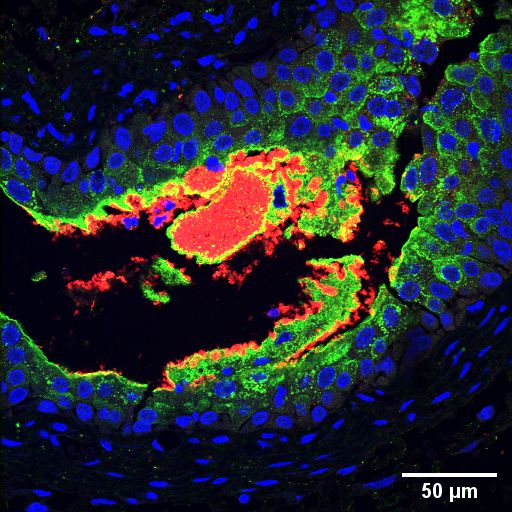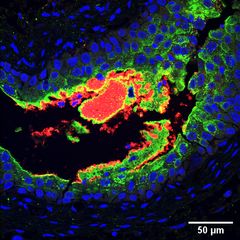New study explains link between diabetes and UTIs
Lower immunity and recurring infections are common in type 1 and type 2 diabetes. Researchers at Karolinska Institutet in Sweden now show that the immune system of people with diabetes has lower levels of the antimicrobial peptide psoriasin, which compromises the urinary bladder’s cell barrier, increasing the risk of urinary tract infection. The study is published in Nature Communications.

Diabetes results from lack of insulin and/or decreased insulin action. Insulin is a hormone that regulates glucose (sugar) and thus energy to the cells. In type 1 diabetes, the body stops producing insulin, while in type 2 diabetes, the cells have become less sensitive to insulin, which contributes to high blood glucose levels. Diabetes is a common disease that affects the health in many ways.
One effect is that it compromises the innate immune system, leaving many people with increased susceptibility to regular infections, such as urinary tract infections (UTI)s caused by E. coli bacteria. In people with diabetes, these are more likely to lead to general blood poisoning, sepsis, originating in the urinary tract.
An endogenous antibiotic
Researchers at Karolinska Institutet have now investigated whether glucose levels in people with diabetes (type 1, type 2, or prediabetes) are linked with psoriasin, an endogenous antibiotic which is a part of the innate immune system.
Using urine, urinary bladder cells and blood serum samples from patients, the researchers analysed levels of psoriasin and other peptides necessary for ensuring that the bladder mucosa remains intact and protects against infection. The findings were then verified in mice and urinary bladder cells with and without infection.
“We found that high glucose concentrations reduce the levels of the antimicrobial peptide psoriasin, while insulin has no effect,” says Annelie Brauner, professor at the Department of Microbiology, Tumor and Cell Biology, Karolinska Institutet who led the study. “People with diabetes have lower levels of psoriasin, which weakens the cells’ protective barrier function and increases the risk of bladder infection.”
Oestrogen therapy reduced bacterial population
Professor Brauner’s research group has previously shown that treatment with oestrogen restores the protective function of bladder cellsx in humans and mice and thereby help to regulate the immune response to a UTI. The researchers therefore tested how oestrogen treatment affects infected cells exposed to high glucose concentrations. They found that the treatment boosted levels of psoriasin and reduced bacterial populations, indicating that the treatment may have an effect also among patients with diabetes.
“We now plan to probe deeper into the underlying mechanisms of infections in individuals with diabetes,” says the study’s lead author Soumitra Mohanty, researcher at the same department at Karolinska Institutet. “The ultimate goal is to reduce the risk of infection in this growing patient group.”
The study was conducted in collaboration with the Karolinska University Hospital, Region Stockholm, Capio and Uppsala University in Sweden and Universitätsklinikum Schleswig-Holstein in Germany. It was largely financed by the Olle Engkvist Foundation, Region Stockholm (ALF funding), the KI Research Foundation, the Swedish Society of Medicine, the Swedish Society for Medical Research (SSMF), the Clas Groschinsky Memorial Foundation, the Åke Wiberg Foundation and the Magnus Bergvall Foundation. There are no reported conflicts of interest.
Publication: “Diabetes downregulates the antimicrobial peptide psoriasin and increases E. coli burden in the urinary bladder”. Soumitra Mohanty, Witchuda Kamolvit, Andrea Scheffschick, Anneli Björklund, Jonas Tovi, Alexander Espinosa, Kerstin Brismar, Thomas Nyström, Jens M. Schröder, Claes-Göran Östenson, Pontus Aspenström, Hanna Brauner, Annelie Brauner. Nature Communications, online 20 September 2022, doi: 10.1038/s41467-022-32636-y
Contacts
For more information, please contact:
Annelie Brauner, professor, senior physician
Department of Microbiology, Tumor and Cell Biology, Karolinska Institutet
Phone: +46 705 863 322
Email: Annelie.Brauner@ki.se
Soumitra Mohanty, researcher
Department of Microbiology, Tumor and Cell Biology, Karolinska Institutet
Phone: +46 76 128 6793
Email: soumitra.mohanty@ki.se
Images



Karolinska Institutet (https://ki.se/en) is one of the world’s leading medical universities. Our vision is to advance knowledge about life and strive towards better health for all. Karolinska Institutet accounts for the single largest share of all academic medical research conducted in Sweden and offers the country’s broadest range of education in medicine and health sciences. The Nobel Assembly at Karolinska Institutet selects the Nobel laureates in Physiology or Medicine.
Subscribe to releases from Karolinska Institutet - English
Subscribe to all the latest releases from Karolinska Institutet - English by registering your e-mail address below. You can unsubscribe at any time.
Latest releases from Karolinska Institutet - English
Fluoride in drinking water is associated with impaired childhood cognition7.3.2025 15:30:00 CET | Pressmeddelande
Elevated concentrations of fluoride can occur in well water, and in some countries, it is added to drinking water to counteract caries in the population. A study from Karolinska Institutet in Sweden now supports a few previous studies indicating that exposure to fluoride during the fetal stage or early childhood may impair cognition in children. The study is published in the journal Environmental Health Perspectives.
Children with ARFID face increased risk of disease17.2.2025 17:00:00 CET | Pressmeddelande
Children with avoidant restrictive food intake disorder (ARFID) have an elevated risk of developing psychiatric and physical conditions, a new study from Karolinska Institutet published in JAMA Pediatrics reports. The study highlights the importance of early identification to improve care of these children.
Preterm babies receive insufficient pain management27.1.2025 15:29:17 CET | Pressmeddelande
A large proportion of babies born very early need intensive care, which can be painful. But the healthcare system fails to provide pain relief to the full extent. This is shown by the largest survey to date of pain in neonatal care, now published in the journal Pain.
New study paves way for immunotherapies tailored for childhood cancers20.1.2025 17:00:00 CET | Pressmeddelande
Researchers at Karolinska Institutet and the Astrid Lindgren Children’s Hospital in Sweden have determined how children’s immune systems react to different kinds of cancer depending on their age. The study, which is published in the journal Cell, reveals significant differences between the immune response of children and adults, and has the potential to lead to new tailored treatments for children with cancer.
AI can improve ovarian cancer diagnoses2.1.2025 11:00:00 CET | Pressmeddelande
A new international study led by researchers at Karolinska Institutet in Sweden shows that AI-based models can outperform human experts at identifying ovarian cancer in ultrasound images. The study is published in Nature Medicine.
In our pressroom you can read all our latest releases, find our press contacts, images, documents and other relevant information about us.
Visit our pressroom